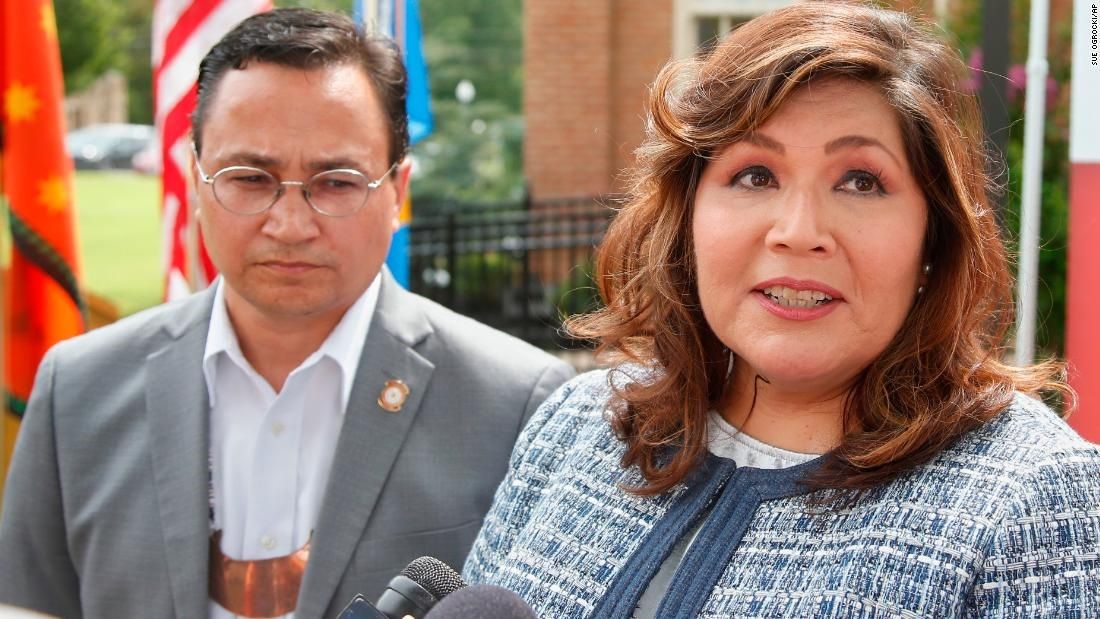Cherokee Nation seeks representation in US Congress

Cherokee Principal Chief Chuck Hoskin Jr. and Cherokee Congressional delegate select Kimberly Teehee (photo courtesy CNN)
OKLAHOMA—Last Wednesday the House Rules Committee in Washington DC, held what CNN has deemed an historic meeting on “seating the Cherokee Nation’s delegate.” The Cherokee Tribe, citing the 1835 Treaty of New Echota, believes wording in that treaty grants them a Congressional non-voting delegate.
Testifying before the committee, Cherokee Nation Principal Chief Chuck Hoskin, Jr., said: “It’s time for this body to honor this promise and seat our delegate in the House of Representatives. No barrier, constitutional or otherwise, prevents this.”
Before delving into the historical record two pertinent facts must be addressed. One, the United States has broken every single treaty it has ever made with any tribe—and is routinely violating those treaties at this very moment. Two, plenary power gives the United States, through act of Congress, the power to eliminate or abrogate any and all agreements with any tribe at any time for any or no reason. Both of these realties could factor heavily into how the Cherokee Nation will fare in this attempt to achieve Congressional representation.
This history begins with the 1830 Indian Removal Act, which resulted in most of the Five Civilized Tribes (of which the Cherokee were one), of being forcibly relocated to Oklahoma Indian Territory, at their expense. This is called the Trail of Tears and resulted in the death of over ten thousand tribal members. Upon arriving in Oklahoma, the tribes were immediately attacked by raiding bands of fierce Comanche, who did not see them as fellow Indians, but just another wave of invaders from the east.
Ambiguously addressed in Article VII of the 1835 Cherokee Treaty is a stipulation that the Cherokee “shall be entitled to a delegate in the House of Representatives of the United States whenever Congress shall make provision for the same.”
It is stated this representative is a consequence of their removal from the United States, and so this representative, logically, appears to be a non-voting representative, such as the present-day Puerto Rican representative, or why state the “removal from the United States” in the stipulation? In addition, Article VII sets no timeline concerning when this should come to pass, supplying the word “whenever” as the closest pinpoint in time for addressing this promise.
Until the 1924 Indian Citizenship Act, Indians could not be a tribal member and a US citizen at the same time. Oglala Tribal Attorney Mario Gonzalez writes, “Tribes were not part of federalism. Federal citizenship and tribal membership were incompatible.”
Gonzalez goes on to explain that “the 14th Amendment excluded Indians who were members of Indian tribes from taxation—because it would be ‘taxation without representation’ in Congress. Indians would have to relinquish their membership in their tribe and be naturalized in Congress (Elk v Wilkins 1884).”
Despite being made US Citizens by the 1924 Act, the operational reality was Indians still had a struggle to exercise their right to vote in both federal and state elections (Harrison v LaVene 1948)
Gonzalez explains that “later federal courts started to hold that Indians were state citizens and could vote in state elections (Goodluck v Apache County 1975).
Questions abound in the efforts of the Cherokee Nation getting Congress to honor their 1835 promise, and these efforts could have a ripple impact on the relationship of other tribes to federal representation, and thus, taxation. Why does the 1835 Treaty allow for representation? In Article VII it does characterize representation as a consequence of being removed from the United States proper to Oklahoma Indian Territory.
Gonzalez cites Professor James Henderson, Research Director for the Canadian Native Law Centre, as sating that the present relationship between tribes and the federal government is “treaty federalism.” Tribes are not sovereign nations in the sense of the difference between the United States and France, but “domestic dependent nations,” and the question becomes how does this impact Congressional representation?
In 1968 Congress passed amendments to the Civil Rights Act to establish provisions allowing the Bill of Rights to apply to Indian Tribes. Taxation is always a key issue when considering representation. In Barta v Ogalla Sioux Tribe in 1958, the Eighth Circuit stated: “It is finally argued that the tax is violative of defendants’ rights in that it constitutes taxation without representation. If it be conceded that the act of the tribe in levying this tax constitutes taxation without representation that alone is certainly not fatal. The taxability of property is not dependent upon the residence of the owner of the property. The property rights of an alien or non-resident are taxable the same as the property of residents who may be said to have representation. As said in Thomas v. Gay, 169 U.S. 264, 18 S.Ct. 340, 345, 42 L.Ed. 740, cited by defendants:”
At the time of Barta, ten years before the 1968 Amendment to the Civil Rights Act, the 14th Amendment was considered not to apply to the Oglala Sioux Tribe.
Should the Cherokees ever get a representative in Congress, regardless of how it impacts other tribes, and “Indians not taxed” overall, what actual power or influence does that representative have officially? And if rhetoric is to be the coup stick any representation of this nature entails, does this representation represent anything beyond the cosmetic for tribal interest?
(Contact James Giago Davies at skindiesel@msn.com).
The post Cherokee Nation seeks representation in US Congress first appeared on Native Sun News Today.
